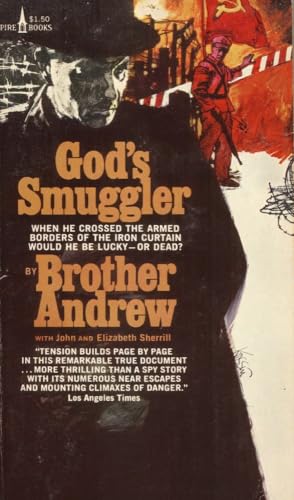God Pointed His Bible Carriers to His CHOSEN Recipients

[Above: Cover of one edition of God's Smuggler]
IS GOD LIVING? Does he develop personal relationships with people? Does he heal? Does he give explicit guidance? Does he provide for his servants’ needs? From experience, “Brother Andrew” could answer yes to each of those questions.
Anne van der Bijl (his Dutch name) rejected Christianity as a young man and joined the Dutch army. Serving in Indonesia, he became so miserable with sin, including war crimes, that he went into battle wearing a flamboyant hat, hoping his head would be blown off. Instead, one of his feet was shattered. Doctors said he’d never walk without a cane.
While he was recovering in Indonesia, a girlfriend in the Netherlands learned of his terrible behavior. Instead of rejecting him, she continued their correspondence and convinced him to begin a Bible study. Nonetheless, when he returned home, he mocked Christianity until, moved by the hymn “Let My People Go,” he unexpectedly found himself with a hunger to learn more about faith. He attended every church service he could. One night, as sleet pelted the siding, he lay in bed and gave his heart to Christ.
Defying the doctors’ predictions, he forced himself over a period of months to learn to hobble without a cane. He committed to becoming a missionary. Meanwhile, he worked in a chocolate factory. This brought him into contact with Geertje, a loud, foul-mouthed woman. One day when she was particularly offensive, he felt the Lord prompt him to order her to shut up and to be ready to board a bus to a revival service the following Saturday. Surprisingly she closed her mouth and showed up for the bus. After the service, van der Bijl took her home on his motorbike. He was prepared to speak to her about the Savior. Instead the Lord impressed him to talk about other things. When van der Bijl did not lecture Geertje, she became afraid his silence meant she had gone too far for God to forgive. She cried all night and prayed for salvation. Everyone was amazed at the transformation in her—possible only because van der Bijl obeyed the Spirit’s prompting.
Shortly afterward, he yielded himself to the Lord without any reservations, none of the “buts” that had held him back until then. Amazingly, his foot healed completely. When he received a letter from World Evangelization Crusade in Scotland delaying a previous offer of admission to its mission school, he felt so sure God intended for him to go there that he ignored the letter and went anyway.
After mastering English and learning lessons of trust in Scotland, van der Bijl returned to his village. By “chance” he had seen an ad inviting students to a Communist youth festival in Warsaw and had applied and been accepted. On this day, 15 July 1955, he made his first trip behind the Iron Curtain. Several times he snuck away from the official group to seek out Christians. Similar behavior on his next trip got him banned from Czechoslovakia for five years. During these and other trips, he became impressed with the need to encourage East European churches with personal contact and with gifts of Bibles.
Using the name “Brother Andrew,” van der Bijl founded Open Doors, an organization that enabled many dedicated workers to slip into East European countries. His work required dozens of trips behind the Iron Curtain, delivering Bibles and encouraging Christians who felt isolated and forgotten. When van der Bijl would come to a border crossing he would pray, “Lord, in my luggage I have Scripture that I want to take to Your children across this border. When You were on earth, You made blind eyes see. Now, I pray, make seeing eyes blind. Do not let those guards see that which You do not want them to see.” Again and again, God brought him and the Bibles through. At times guards overlooked tracts and Bibles laying in plain view.
Of deep suffering and the need to be faithful he learned much but also much about miraculous provision and grace. Once in Yugoslavia he mentioned in a meeting that he prayed every morning for his car to run. The next day a Christian mechanic asked to see it. The man shook his head. By all rights the car should not be able to run at all, he said. He asked permission to clean the engine and change the oil, adding, “It hurts me to see you abuse a miracle.”
On a trip to Moscow with Hans Gruber, a fellow Dutchman, God demonstrated again to van de Bijl his ability to guide. He and Gruber prayed God would lead them to whom he would have them contact. Scanning the crowd from separate points, both saw a thin, balding man and each felt the Spirit point to him. The thin man turned out to be a pastor from a Siberian church of 150 members without a single Bible. The Holy Spirit had prompted him to come to Moscow, promising him a Bible. At first, he had resisted, knowing Bibles were as hard to come by in Moscow as in Siberia. Yet here he was, two thousand miles west of home speaking with two Dutchmen an equal distance east from their homes. They gave him a Bible and would have given him more, but the KGB interfered.
Van der Bijl’s story is told in God’s Smuggler from which most of these divine interventions are drawn.
—Dan Graves
----- ----- -----
Almost as soon as Bibles began to be printed, their producers had to smuggle copies past hostile governments. William Tyndale, one of the early translators of the English language Bible, had to find ways to smuggle God's word into his native land. Watch William Tyndale: Man with a Mission at RedeemTV.
William Tyndale: Man with a Mission can be purchased at Vision Video.
Other Events on this Day
- Eastern Europe’s Desperate Struggle with the Teutonic Knights
- HAWAIIAN CHRISTIANS CLAIMED SOULS IN THE MICRONESIAN ISLANDS







